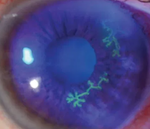Summit Eye Center Blog
Herpes Keratitis

Herpes keratitis is a viral infection in the eye caused by the herpes simplex virus (HSV). There are two main types of the virus:
• Type I is the most common and primarily infects the face, involving one of the three branches of the trigeminal nerve. The result is the familiar “cold sore” or “fever blister.”
• Type II is the sexually transmitted form that infects the genitals
Both types can affect the eye, but Type I is by far the most frequent to cause an eye infection. Type II rarely affects the eye. It is estimated that about 90% of the population has been exposed to HSV Type I, usually during childhood.
Initially there is a primary infection. It is most common for the primary infection to involve the lips. The virus travels from the skin to the nerve cells. In the nerve cells, the virus can remain dormant for months or years. The virus can then be reactivated causing a new sore.
The following can cause reactivation of the virus:
• Stress
• Changing seasons
• Sun or UV exposure
• Trauma
• Medications
• Menstruation
• Medications
• Spicy foods
Symptoms of herpes keratitis include the following:
• Pain
• Redness
• Tearing
• Blurred vision
• Light sensitivity
If you experience any of these symptoms, it is important to see an eye doctor. Herpes simplex keratitis can lead to scarring that can significantly impact one’s vision. In the extreme situation, scarring may require a corneal transplant to restore vision.
The treatment of herpes keratitis depends on the severity of the infection. Mild infections are often treated with topical antiviral and sometimes oral antiviral medications. As the eye is healing, additional medications may be used to reduce scarring. It is important to see an eye doctor before beginning any treatment, because some medications can actually make the infection worse.
Although there is no cure for herpes, there are things that can be done to minimize the risk of reactivation/future outbreaks. The two most common are avoidance of triggers for reactivation and prophylactic treatment with oral antiviral medications.
The doctors at Summit Eye Center focus on the medical and surgical treatment of the eye. If you would like to schedule an appointment call 816-246-211 or email
